
Tanzania Travel & Safari Company
Kilimanjaro National Park
Safari thrill seekers, your next expedition is lying in wait!

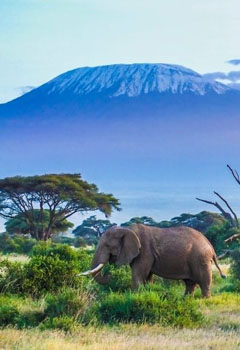
Kilimanjaro National Park, Tanzania is located near the region of the municipality of Moshi. The park covers an area of 1,688 sq. km. and protects the largest free-standing mountain in the world – Mount Kilimanjaro. The snow-capped peak of the mountain is a superior natural phenomenon, standing in isolation above the surrounding plains that overlook the savannah.
The montane forest of the park is arguably the most important biological region. This means that visitors on a Tanzania Safari Vacations should never miss out on exploring the area. The region harbors rare and endemic flora along with 80% of the overall large mammal species that you’ll get to witness on a Kilimanjaro National Park Safari.
Wildlife Show | Tanzania
Safar-Mountain Fusion | Tanzania
Vibrant Wilderness | Tanzania
Avian Delights | Tanzania
Caldera Aquatics | Tanzania
An Avian Heaven | Tanzania

The dry season (from June to October) is the best time for a Kilimanjaro National Park Day Tour. However, a visit in the month of January is also ideal as you can climb Kilimanjaro and admire the natural surroundings. These periods offer clearer skies, pleasant temperatures, and reduced chances of rainfall. This, in turn, creates optimal conditions for both safaris and mountain treks.
Below is a deeper exploration of both the dry and shoulder seasons of Kilimanjaro National Park along with visiting aspects. This will help you land at the best time for Kilimanjaro National Park Day Trips.
| Aspect | Dry Season (Jan-Mar, Jun-Oct) | Shoulder Season (Nov-Dec, Apr-May) |
|---|---|---|
| Weather Conditions | Clear skies, mild temperatures | Moderate temperatures, occasional showers |
| Wildlife Viewing | Migration, predator-prey interactions | Relatively quieter wildlife |
| Summit Clarity | Clear views, better summit visibility | Chance of clouds, potential haze |
| Crowds and Costs | Higher tourist numbers, increased costs | Fewer tourists, potentially lower costs |
| Altitude Consideration | Altitude effects, cold temperatures | Altitude effects, moderate temperatures |
| Park-Specific Factors | Unique events, birdwatching opportunities | Calving season at Lake Chala |
| Cultural Experiences | Marangu Cultural Tourism Week, local festivals | Opportunities for cultural interactions |
Best Weather - June to October (Virtually no rainfall at all)
Worst Weather-– April, May, and November (The wettest months of the year)
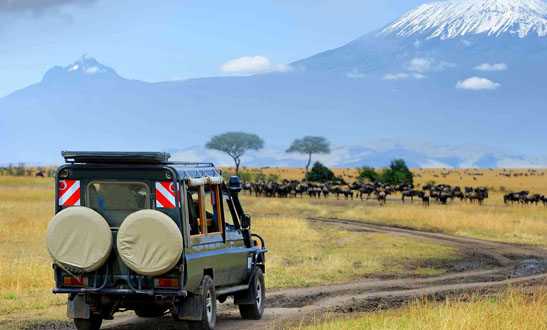
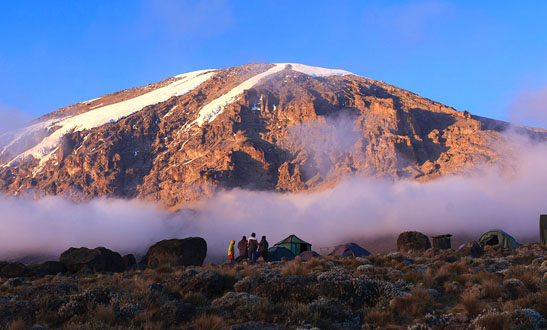
The best way to get to Kilimanjaro National Park is by flying into Kilimanjaro International Airport (JRO). The airport is served by several airlines daily and the closest major cities to the park are Arusha and Moshi.
Based on the country you’re flying from; you can generally catch a direct flight to the airport via the Gulf (Qatar Airlines and Emirates) or Europe (KLM).
Below is the approximate distance between Kilimanjaro National Park and other Safari Vacation In Tanzania destinations:
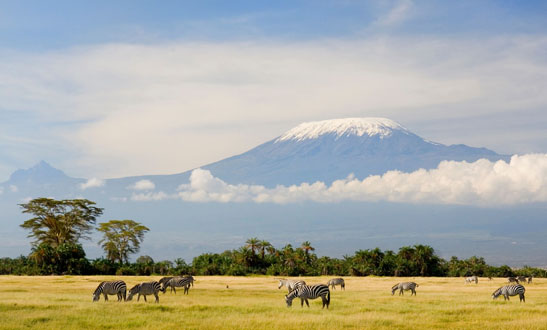
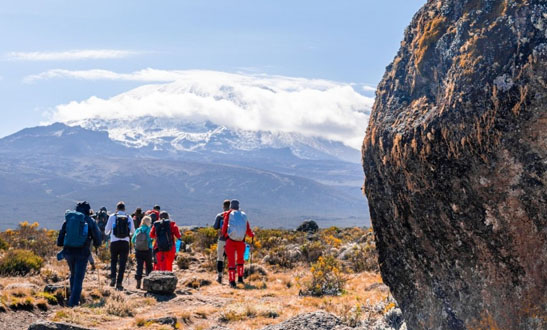
Scribble down these Kilimanjaro National Park essentials for a day tour adventure that is elevated and extraordinary:
a) Park's Timing - Kilimanjaro National Park is open year-round, with varying entrance fees based on location and activities. The park's gates usually open early in the morning and close by sunset.
b) Permits Requirement – Climbing Mount Kilimanjaro (which is located inside the park) requires a permit. This can be obtained through registered tour operators. Different routes have varying permit costs, and booking is recommended.
c) Park's Purpose – Kilimanjaro National Park aims to conserve the diverse ecosystems of Mount Kilimanjaro, from rainforests to glaciers. It enables sustainable tourism, research, and local community involvement.
d) Languages –English and Swahili are the main languages spoken in Kilimanjaro National Park. English is commonly used for communication with park staff and guides.
e) Exploring the Park – Visitors can explore Kilimanjaro National Park through guided safaris and treks. Various routes lead to the summit of Mount Kilimanjaro, each offering unique landscapes and challenges.
f) Required Vaccinations – Visitors are advised to have up-to-date vaccinations for diseases like yellow fever, hepatitis, and typhoid before their Day Trip to Kilimanjaro National Park. A yellow fever vaccination certificate might be required for entry, depending on your origin.
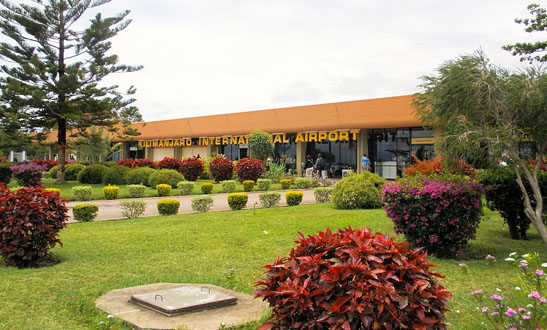
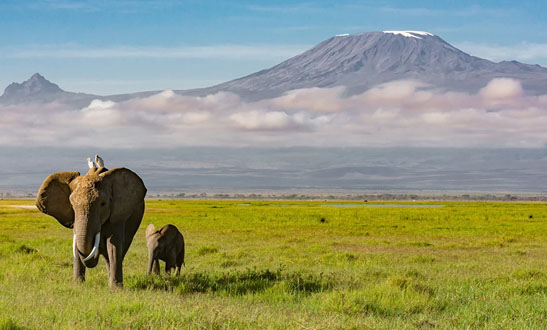
While game viewing is not the primary focus of a Kilimanjaro National Park Tour, visitors are still likely to see a varied number of animals. The fertile lower slopes of Kilimanjaro are home to various primates and birds.
Highlighted Wildlife Sightings Monkeys, Baboons, Elephants, Giraffes, several species of antelopes, bush babies, hyenas, servals, honey badgers, and porcupines.


Savour the experiences of Kilimanjaro in just one day. Take part in an ensemble of Kilimanjaro National Park Activities that redefine the word exceptional. The foremost pursuits for you are described below:
a) Walking Safaris - – Experience utter diversity on an enthralling Kilimanjaro National Park Safari. This is where elephants, giraffes, and zebras roam amidst stunning landscapes.
b) Trekking Mount Kilimanjaro – – An epic journey awaits you during a Kilimanjaro National Park Tour, where you’ll get to climb Africa’s highest peak. Conquer diverse terrains and climates for an unparalleled summit experience.
c) Birdwatching – Delight in seeing the Birds of Kilimanjaro National Park, including colourful avian species like trogons and sunbirds that call the park home.
d) Cultural Tours – Immerse yourself in the Chagga tribe's rich culture through guided village tours, and witnessing traditional practices and craftsmanship.
Visiting Shira Plateau Explore the scenic Shira Plateau. This is the place where vast savannahs meet the mountain, offering opportunities to encounter unique wildlife against a setting of towering peaks.
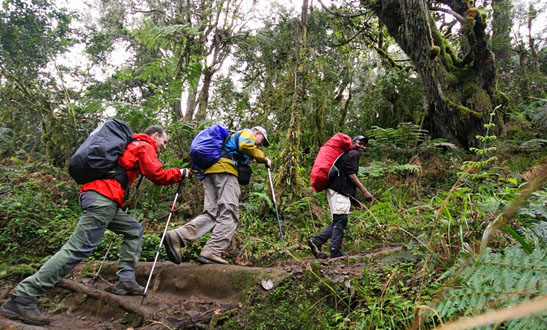
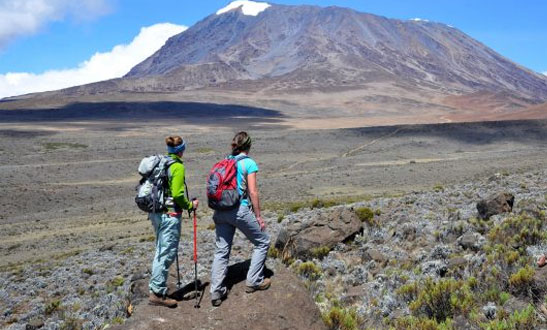
From selecting iconic destinations like the Serengeti to tailoring your accommodations, activities, and even culinary preferences, your vision becomes a personalized masterpiece.
Start your Tanzanian safari adventure with confidence, knowing that our safari packages blend expertise, comfort, and discovery.
Our safari packages go beyond exploration; they are your gateway to responsible travel.
Email: info@conservationcaravansafaris.com
Phone/Whatsapp : +255 784 379 383
Dive into the logistical depths of Kilimanjaro National Park safaris with our FAQs.
The Kilimanjaro National Park Entrance Fee is $70 (for visitors above the age of 16) and $20 (for visitors between the ages of 5-15). Remember that entry fees vary based on location and activity within Kilimanjaro National Park. Different gates and activities may have different fees.
Permits for Mount Kilimanjaro treks are required and can be obtained through registered tour operators. Each route has varying permit costs.
Kilimanjaro National Park Wildlife sightings include elephants, lions, zebras, giraffes, and numerous bird species.
The dry seasons of January to March and June to October offer optimal conditions for wildlife viewing and trekking. It’s largely because of clearer skies and milder temperatures.
A Kilimanjaro National Park Safari boasts the chance to witness various bird species, such as trogons and sunbirds. This in turn makes the park a haven for birdwatching enthusiasts.
Capture wildlife and landscapes effectively by using appropriate camera settings and making use of a wide zoom lens. Always keep in mind to respect the space of animals to ensure a memorable Kilimanjaro National Park Tour experience.
Yes, English is commonly spoken in the park, ensuring effective communication with guides and staff.
It's recommended to have up-to-date vaccinations for diseases like yellow fever, hepatitis, and typhoid before your Day Trip to Kilimanjaro National Park.
This is your source for practical travel tips and insights that will elevate your Tanzanian experience. Navigate the particulars of planning your trip, make well-informed choices, and have a journey filled with adventure!
Chart your course through the wonders of Tanzania, guided by our expert recommendations. Here are some of the best Tanzania Safari Vacations spots to explore on your travels.